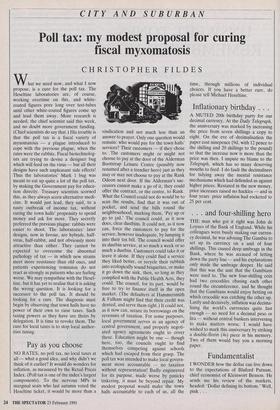Pay as you choose
NO RATES, no poll tax, no local taxes at all — what a good idea, and why didn't we think of it earlier? It would do wonders for inflation, as measured by the Retail Prices Index. (Poll tax is one of the index's largest components). To the nervous MPs in marginal seats who last autumn voted the Heseltine ticket, it would be more than a vindication and not much less than an answer to prayer. Only one question would remain: who would pay for the town halls' services? Their customers — if they chose to. The customers might or might not choose to pay at the door of the Alderman Bootstrap Leisure Centre (possibly now renamed after a trendier hero) just as they may or may not choose to pay at the Rank Odeon next door. If the Alderman's suc- cessors cannot make a go of it, they could offer the contract, or the centre, to Rank. What the Council could not do would be to scan the results, find that it was out of pocket, and send the bills round the neighbourhood, marking them, Pay up or go to jail.' The council could, as it now does, clear dustbins. It could not, as it now can, force the customers to pay for the service, however inadequate, by lumping it into their tax bill. The council would offer its dustbin service, at so much a week or so much a dustbin. Customers could take it or leave it alone. If they could find a service they liked better, or recycle their rubbish into ecologically sound briquettes, or make it go down the sink, then, so long as they complied with the Public Health Acts, they could. The council, for its part, would be free to try to finance itself in the open market. (The defaulters at Hammersmith & Fulham might find that their credit was dented, and serve them right.) It could not, as it now can, secure its borrowings on the revenues of taxation. For some purposes, local government serves as an agency of central government, and properly negoti- ated agency agreements ought to cover these. Education might be one — though here, too, the councils ought to find themselves competing against schools which had escaped from their grasp. The poll tax was intended to make local govern- ment more accountable — no taxation without representation! Badly engineered for its purpose, made worse by panicky tinkering, it must be beyond repair. My modest proposal would make the town halls accountable to each of us, all the time, through millions of individual choices. If you have a better cure, do please tell Michael Heseltine.


















































 Previous page
Previous page